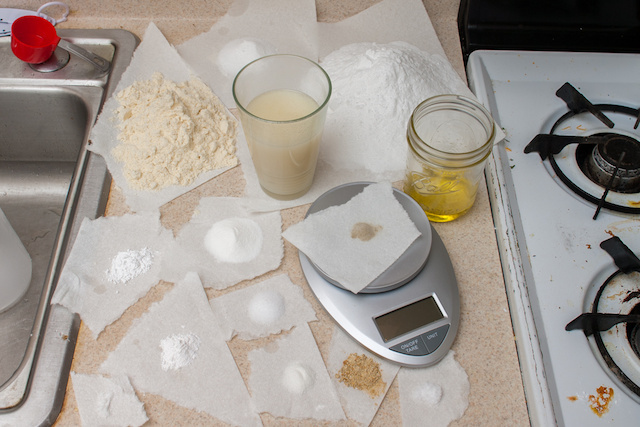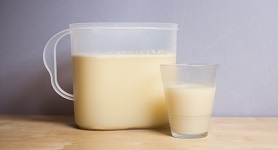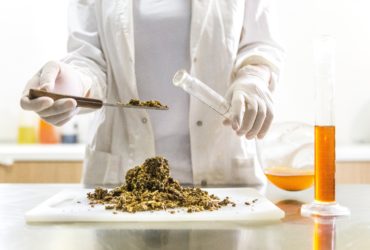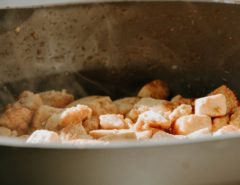By: Bethany Richardson
Cooking for one’s self can be a time-consuming task, even if you are like me and generally enjoy being in the kitchen trying new recipes. I do my best to make the majority of my meals at home; planning quick and easy meals and taking shortcuts by doing prep work ahead of time help a great deal. However, there are certainly days when I just can’t muster up the energy to even make pasta and I inevitably pick food up (especially when there’s $.99 taco night at the fresh Mexican place just down the street).
Although this scenario is pretty common for many people, one man has taken his disdain for planning, preparing and even eating true meals completely to another level. Rob Rhinehart, a 24-year old software engineer, has begun making a “beverage” of sorts that, he claims, contains all the macro and micronutrients vital to living a healthy life. His drink, named Soylent, is a bland, beige mixture of ingredients such as oligosaccharides, olive and fish oils, sodium chloride, the 9 essential amino acids, fiber, and a variety of vitamins and minerals. Rhinehart claims to really enjoy the beverage and states that he “doesn’t miss food”; however, he does admit to going out to eat on occasion with friends.
 Rhinehart’s “ingredients” for soylent
Rhinehart’s “ingredients” for soylent
As a food scientist, you might be shaking your head right about now, just as I was when I first read this article. Regardless of whether or not I am the cook- I absolutely love to eat. Many of my most important social interactions involve some sort of eating or drinking- from catching up with my boyfriend over our nightly dinner to having wedding cake and toasting with champagne to celebrate friends’ nuptials. Getting in the kitchen to make cookies can always make me feel better after a bad day. I love food so much that I’ve chosen to make a career out of it.
While I doubt many people would be willing to convert to this type of lifestyle, Rhinehart has actually attracted many followers- so much so that he is recruiting participants for an independent study on soylent. Although I personally think his diet is a little absurd for someone who has access to an abundant number of healthy and safe foods, I agree with his viewpoint that it might be a possible solution to starvation and malnutrition in developing countries. A registered dietician could certainly give a better analysis on the limitations of his diet, but it is likely he hasn’t considered potential issues with some aspects of this diet- such as bioavailabilty/absorption of the nutrients and whether or nor he is actually consuming the correct types/amounts of nutrients. If you would like to learn more about Rhinehart and his diet, he writes a blog “Mostly Harmless” and was also interviewed by Vice.
What do you think about his foodless lifestyle? Is is something you would ever try yourself?
Photo credit: http://www.vice.com/en_uk/read/rob-rhinehart-no-longer-requires-food






I’m glad you brought this up. I was reading an article on this the other day and thought to myself “why??”. I’m with you – I could not give up food either. In addition to missing out on the amazing flavors and textures food offers, he’s losing the health benefits we gain from the physical structures of foods such as fiber. Beyond that, I don’t think this is a sustainable way to live as we weren’t meant to ingest powdered nutrients, we should be getting them from food. I would also be worried about vitamin/mineral toxicity if too much of an ingredient is added. Reading his site, he seems to have had pretty good results with it so far but only long term data will tell.
I’m glad you posted this. I can’t remember where, but I read about this recently and wasn’t sure what to think. As an up and coming food scientist, I may be biased, but food is SO much more than just fuel. It’s an experience: textures, flavors, indulgences, VARIETY! He says he still eats some food on weekends or when out with friends. And he claims it tastes like the “best breakfast of my life”…I find it hard to believe that this concoction tastes better than a big stack of pancakes or a fluffy omelet..healthier, maybe.
He says that “The raw materials to provide me with 2629 kcal / day purchased at personal scale costs $154.82 per month, plus shipping”. This isn’t necessarily saving much money if you are a frugal shopper like myself because you could easily grocery shop and even go out once or twice a month for about the same amount if only feeding one person.
I do agree with you that it could be a beneficial option for starvation and malnutrition, but I don’t see it attracting the average American consumer. However, it’s an interesting study, so more power to him, if that’s what he prefers.
I agree with Emily, total lack of variety. In my opinion, that can lead to bad decisions later on because of getting so bored with this “perfect food.” It is an interesting concept and cool that he is doing this little experiment on himself. However, I worry that if he brings other people into it he might have a lot more on his hands that he wants to gamble with. It’ll be interesting to see what happens to him and his soylent followers. If it truly is sustainable then this could be a great thing to give people that are malnutritioned.
Great comment! I will definitely be following up with where this ends up in the near future!
Thanks for the great article, since seeing this blog post I decided to further research this whole Soylent food free lifetyle. I think that it is a clever idea, and I agree with Lauren that it will be interesting to see where this ends up. If it is as sustainable as he claims, it would be a fantastic step in the right direction in helping solve the malnutrition and hunger problems so many countries are faced with. I am however, a total foodie and can think of nothing worse than not being able to experience the different flavours and textures in a dish. But each to his own I suppose. What do you think some of the long term effects of this diet could be, considering Soylent might not contain the right amount of nutrients etc?